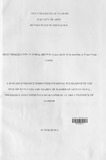| dc.description.abstract | The purpose of this study was to examine the current system of decentralization and the extent to which it facilitates participation in the two councils. The study was guided by the following objectives: To examine the policy and legal frameworks guiding the operations of Trans Nzoia Councils, To examine the Local Authority Service Delivery and Action Plan (LASDAP) process and to evaluate the level of local community representation and participation in decision making in the councils, To assess the capacity of the human resources available in the councils for development and to assess the financial and other resource capacity of the councils.
The data was obtained through personal interviews with 10 informants. Questionnaires and in-depth interviews were used as data collection instruments. Document review was also used. This data was analyzed and presented using qualitative analysis and presentation. From the findings and discussions, the study concludes that there are strategic plans in place that guide development of the projects towards the attainment of Vision 2030. It also concludes that community participation in development processes is moderate but this can be improved. Some of the factors that constrain project planning include inadequate knowledge of project planning and the limited training and capacity building. Illiteracy among the Local authority staff also limits their abilities to implement projects hence causing project delays.
The study recommends a situation where there is a complete devolution where fiscal and political decentralization is established. It will be prudent financial management if all the devolved funds could be pooled. These funds are addressing the needs of the citizen at the Local level and hence should have one management to avoid wastage, duplication of programs and activities. The control and accountability of the consolidated fund will be easier than the many funds. There is need to develop and implement elaborate Information, Education and Communication guidelines to enhance the LASDAP process. Regarding management, besides amending the strategic plan and the Local Authority Transfer Fund (LA TF) Act, a committee should be enforced to ensure compliance to laid out procedures for project selection through disciplinary measures. To ensure sustainability, it is therefore proposed that in future all LATF projects must at the design phase indicate what the future running costs will be and where this will be raised from or funded. | en_US |

